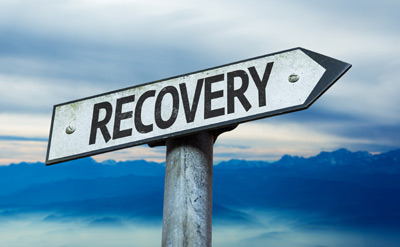
You don’t recover from an addiction by stopping using.
You recover by creating a new life where it is easier to not use.
If you don’t create a new life, Then all the factors that brought you to your addiction will eventually catch up with you again.

You don’t recover from an addiction by stopping using.
You recover by creating a new life where it is easier to not use.
If you don’t create a new life, Then all the factors that brought you to your addiction will eventually catch up with you again.

Most of us can think of at least one Robin Williams role that brings an instant smile to our face just thinking of his comedic genius and ability to make us laugh. With the news of his death from an apparent suicide as a result of suffering from severe depression, we can’t help but ask the question, “how can someone that seemed so happy on the outside, be hurting so much on the inside?”
The Guardian addressed the issue with depression and how it can be overwhelming difficult to deal with for some people. The article brought great insight on those suffering from depression.
News of Robin William’s death due to apparent suicide, said to be a result of suffering severe depression, is terribly sad. But to say taking your own life because of such an illness is a ‘selfish’ act does nothing but insult the deceased, potentially cause more harm and reveal a staggering ignorance of mental health problems
Many words can be used to describe Robin Williams. ‘Selfish’ should not be one of them. Photograph: Allstar/Universal PicturesSportsphoto Ltd.
News broke today that Robin Williams had passed away, due to apparent suicide following severe depression. As the vast majority of people will likely have already said, this was terribly heart-breaking news. Such an iconic, talented and beloved figure will have no shortage of tributes paid to him and his incredible legacy. It’s also worth noting that Robin Williams was open about his mental health issues.
However, despite the tremendous amount of love and admiration for Williams being expressed pretty much everywhere right now, there are still those who can’t seem to resist the opportunity to criticize, as they do these days whenever a celebrated or successful person commits suicide. You may have come across this yourself; people who refer to the suicide as “selfish”. People will utter/post phrases such as “to do that to your family is just selfish”, or “to commit suicide when you’ve got so much going for you is pure selfishness”, or variations thereof.
If you are such a person who has expressed these views or similar for whatever reason, here’s why you’re wrong, or at the very least misinformed, and could be doing more harm in the long run.
Depression, the clinical condition, could really use a different name. At present, the word “depressed” can be applied to both people who are a bit miserable and those with a genuine debilitating mood disorder. Ergo, it seems people are often very quick to dismiss depression as a minor, trivial concern. After all, everyone gets depressed now and again, don’t they? Don’t know why these people are complaining so much.
I’ve said it before, and I’ll say it again; dismissing the concerns of a genuine depression sufferer on the grounds that you’ve been miserable and got over it is like dismissing the issues faced by someone who’s had to have their arm amputated because you once had a paper cut and it didn’t bother you. Depression is a genuine debilitating condition, and being in “a bit of a funk” isn’t. The fact that mental illness doesn’t receive the same sympathy/acknowledgement as physical illness is often referenced, and it’s a valid point. If you haven’t had it, you don’t have the right to dismiss those who have/do. You may disagree, and that’s your prerogative, but there are decades’ worth of evidence saying you’re wrong.

How, many seem to wonder, could someone with so much going for them, possibly feel depressed to the point of suicide? With all the money/fame/family/success they have, to be depressed makes no sense?
Admittedly, there’s a certain amount of logic to this. But, and this is important, depression (like all mental illnesses) typically doesn’t take personal factors into account. Mental illness can affect anyone. We’ve all heard of the “madness” of King George III; if mental illness won’t spare someone who, at the time, was one of the most powerful well-bred humans alive, why would it spare someone just because they have a film career?
Granted, those with worse lives are probably going to be exposed to the greater number of risk factors for depression, but that doesn’t mean those with reduced likelihood of exposure to hardships or tragic events are immune. Smoking may be a major cause of lung cancer, but non-smokers can end up with it. And a person’s lifestyle doesn’t automatically reduce their suffering. Depression doesn’t work like that. And even if it did, where’s the cut-off point? Who would we consider “too successful” to be ill?
If we’re being optimistic, it could be said that most of those describing suicide from depression as selfish are doing so from a position of ignorance. Perhaps they think that those with depression make some sort of table or chart with the pros and cons of suicide and, despite the pros being far more numerous, selfishly opt for suicide anyway?
This is, of course, nonsensical. One of the main problems with mental illness is that is prevents you from behaving or thinking “normally” (although what that means is a discussion for another time). A depression sufferer is not thinking like a non-sufferer in the same way that someone who’s drowning is not “breathing air” like a person on land is. The situation is different. From the sufferers perspective, their self-worth may be so low, their outlook so bleak, that their families/friends/fans would be a lot better off without them in the world, ergo their suicide is actually intended as an act of generosity? Some might find such a conclusion an offensive assumption, but it is no more so than accusations of selfishness.
The “selfish” accusation also often implies that there are other options the sufferer has, but has chosen suicide. Or that it’s the “easy way out”. There are many ways to describe the sort of suffering that overrides a survival instinct that has evolved over millions of years, but “easy” isn’t an obvious one to go for. Perhaps none of it makes sense from a logical perspective, but insisting on logical thinking from someone in the grips of a mental illness is like insisting that someone with a broken leg walks normally; logically, you shouldn’t do that.
Stephen Fry, in his interview on Richard Herring’s podcast, had a brilliant explanation about how depression doesn’t make you think logically, or automatically confide in friends and family. I won’t spoil it by revealing it here, but I will say it involves genital warts.

Say you don’t agree with any of the above, that you still maintain that for someone with a successful career and family to commit suicide is selfish. Fine. Your opinion, you’re entitled to have it, however much we may disagree.
But why would you want to publicly declare that the recently deceased is selfish? Especially when the news has only just broken, and people are clearly sad about the whole thing? Why is getting in to criticize the deceased when they’ve only just passed so important to you? What service are you providing by doing so, that makes you so justified in throwing accusations of selfishness around?
Do you think that depression is “fashionable?” And by criticizing the sufferers you can deter others from “joining in”? Granted, we hear more about depression than we used to these days, but then we know what it is now. We see a lot more photos from Mars these days, because we have the means of doing so now, not because it’s suddenly trendy.
Perhaps you are trying to deter anyone else who might read your views from considering suicide themselves? Given that statistics suggest that one in four people suffer some sort of mental health problem, this isn’t that unlikely an occurrence. But if someone is genuinely depressed and feels their life is worthless, seeing that others consider their feeling selfish can surely only emphasize their own self-loathing and bleakness? It suggests that people will hate them even in death.
Maybe you know some people who have “attempted” suicide purely for attention? Fair enough; a debatable conclusion, but even if you’re right, so what? Surely someone who succeeds at committing suicide is a genuine sufferer who deserves our sympathy?
Perhaps you feel that those expressing sorrow and sadness are wrong and you need to show them that you know better, no matter how upsetting they may find it? And this is unselfish behavior how, exactly?
A brilliant but tortured individual has taken his own life, and this is a tragedy. But leveling ignorant accusations of selfishness certainly won’t prevent this from happening again. People should never be made to feel worse for suffering from something beyond their control.
If you feel you are dealing with depression, the charity MIND has many helpful sources, but there are many other avenues you can pursue.
As a therapist, I have dealt with family members, particularly adults and children of those who have suicided who ask, “Why didn’t they love me enough to stay alive for me?” It is particularly difficult for close ones to realize that suicide of a parent does not mean that you were not loved. It means that your parent was in so much physical and emotional pain, they couldn’t stand to live any longer.
Most people used the word “depression” lightly. Someone may say they are depressed when they are actually sad about something that could pass in a short period of time. Clinical depression is not like that. Clinical depression is when there are sysmptoms that last for a month or more such as 1) not eating or eating too much, 2) not sleeping or sleeping too much, 3) feeling extremely tearful, 4) feeling like you can’t focus or concentrate and 5) feeling like everyone else is out there having fun and you feel numb. When people have 2 or more of these symptoms, for more than one month, doctors usually prescribe antidepressants. People have described their symptoms as, “I feel like there’s a hundred pounds of weight that I carry on each shoulder”, “I feel like I’m swimming in a room full of molasses,” “I feel like there’s a grey cloud around me above me that won’t go away.”
Support those with clinical depression to seek professional help. Be empathetic. Depression is a real illness.
I recently attended a workshop on Pornography and wanted to share some facts with you.
Most sex education in this country comes from pornography. 90% of high school kids have sex before the end of high school and they learn most of what they know from porn.
What does Porn sex education teach?
Porn use is common and  couples often use it together to enhance foreplay and increase arousal. It becomes a problem when one uses it significantly for the following reasons:
couples often use it together to enhance foreplay and increase arousal. It becomes a problem when one uses it significantly for the following reasons:
Interest and energy is fueled in relationships. The partners are the source of interest and energy. When porn becomes a part of the relationship, it moves the target from the partner to the porn. After watching much porn, one’s arousal template is high. This means it takes more to get the same effect. Therefore, you don’t look at your partner the same and it takes more effort to get aroused or reach orgasm. “You” are the source of what interest’s me, but porn can take that away by moving the target from partner to porn.
A good example of the above is illustrated in the movie “Don Juan”. He is a charming good looking man who easily has sexual encounters with most women he meets, yet is addicted to porn. He then meets a woman who discovers his secret and asks him why, when he can get any woman he wants, he is addicted. His explains that with porn, he can totally loose himself. He adds, “it’s convenient and because it’s easier”. It’s easily accessible, inexpensive, there is no dating, no having to please a demanding female, no dealing with relationship conflicts. For those with Erectile Dysfunction, no fear of displeasing a woman or having shame regarding performance.
All the above is reason to see why porn can be a threat to a relationship.
In addition, 52% of divorces site porn as an issue.
Just letting you know about my “12 hour Texas State DWI Education Class” being presented next weekend….
in Central Houston
3730 Kirby Drive, Suite 910
Houston, Texas 77098
May 9, Friday, 4:30- 8:30
May 10, Saturday 10:00 am- 2:00 pm
May 11, Sunday 10:00 am- 2:00 pm
– Small Classes
– Confidential
– After standard work hours
– Centrally Located
– $199. for entire 12 hour course
To Register call 713-524-9525
Denise O’Doherty – Certified DWI Instructor
I will be teaching a 12 Hour State of Texas – DWI Education Class in Central Houston at 3730 Kirby Drive, Suite 910 Houston, Texas 77098.
August 6th, Wednesday from 4:30-8:30pm
August 7th, Thursday from 9:30-1:30pm
August 8th, Friday from 4:30-8:30pm
Benefits Include:
– Small Classes
– Confidential
– After standard work hours
– Centrally Located
– $199. for entire 12 hour course
– Completion Certificates Awarded at Class Conclusion
To Register call 713-524-9525
Denise O’Doherty – Certified DWI Instructor
Great article expressing concern about over use of medication rather than talking therapy in  The Guardian Weekly (British Newspaper) dated 11/29/13. Most psychiatrists agree that antidepressants work for people with severe illness but are not supposed to be the first resort for those with mild depression. The article supports the use of antidepressants but says that, “Experience broadly shows that while antidepressants can be effective at treating symptoms of depression, it is talking therapies that will help patients understand what is happening to them, and how to avoid relapse. The chances of a recurrence of depression are far higher in people who do not have some form of psychiatric therapy than for those who do”. We know that drugs do work, but they can’t cure unhappiness. This article supports medication for clinical depression, yet stresses the value of psychotherapy to help people deal with and manage frustration, adversity, sadness and situational dilemmas.
The Guardian Weekly (British Newspaper) dated 11/29/13. Most psychiatrists agree that antidepressants work for people with severe illness but are not supposed to be the first resort for those with mild depression. The article supports the use of antidepressants but says that, “Experience broadly shows that while antidepressants can be effective at treating symptoms of depression, it is talking therapies that will help patients understand what is happening to them, and how to avoid relapse. The chances of a recurrence of depression are far higher in people who do not have some form of psychiatric therapy than for those who do”. We know that drugs do work, but they can’t cure unhappiness. This article supports medication for clinical depression, yet stresses the value of psychotherapy to help people deal with and manage frustration, adversity, sadness and situational dilemmas.
There is a new Texas ruling regarding drinking and driving as  explained to me today by Judge Jay Karahan who presides over Harris County Criminal Court #8. As of 2 weeks ago, Texas now has a “No Refusal” policy regarding alcohol testing that is in effect 24/7, 365 days a year. That means that if you are pulled over and charged with a DWI, and you refuse the breathalyzer, you will be given a mandatory blood test, at the police station or a medical facility. The Supreme Court says this is OK since alcohol in your system is considered evidence of a crime. You no longer can refuse a breathalyzer and have a hearing to argue the case since there was a “lack of concrete medical evidence”. If you are suspected of drinking and driving, and refuse a breathalyzer, the new policy ensures you will be tested, via blood, through a search warrant by the arresting officer, a judge or magistrate.
explained to me today by Judge Jay Karahan who presides over Harris County Criminal Court #8. As of 2 weeks ago, Texas now has a “No Refusal” policy regarding alcohol testing that is in effect 24/7, 365 days a year. That means that if you are pulled over and charged with a DWI, and you refuse the breathalyzer, you will be given a mandatory blood test, at the police station or a medical facility. The Supreme Court says this is OK since alcohol in your system is considered evidence of a crime. You no longer can refuse a breathalyzer and have a hearing to argue the case since there was a “lack of concrete medical evidence”. If you are suspected of drinking and driving, and refuse a breathalyzer, the new policy ensures you will be tested, via blood, through a search warrant by the arresting officer, a judge or magistrate.
As a drug and alcohol counselor, who teaches DWI Offender Education Classes, I’ll continue to say, that you will have an even better time by eliminating the worry and stress from any legal problems by getting a designated driver or a taxi. This extra attention done ahead of time, can prevent the tremendous emotional and financial stress of getting a DWI. As always, let’s have a good time, but not drink and drive.
Do you have an alcohol addiction problem? Have a friend who you think may have a problem with alcohol or drugs? I can help!
Contact me at 713-823-4001 or fill out the form below. I welcome your call so we can discuss your specific situation and the benefits therapy may provide for you.
By Denise O’Doherty, psychotherapist and drug and alcohol counselor.
Most people think that they can  drink and drive as long as they are not drunk. Many of us have driven home after having one or two drinks (or more), and have not thought much about it. We are all aware that the legal blood alcohol level is .08. This means that anything over .08 means one is legally “drunk” and, if pulled over, would be given a DWI. To some, this means that if you get pulled over, and are asked to take a breathylyzer test and you are under .08, you would be OK and not arrested. THIS IS NOT TRUE.
drink and drive as long as they are not drunk. Many of us have driven home after having one or two drinks (or more), and have not thought much about it. We are all aware that the legal blood alcohol level is .08. This means that anything over .08 means one is legally “drunk” and, if pulled over, would be given a DWI. To some, this means that if you get pulled over, and are asked to take a breathylyzer test and you are under .08, you would be OK and not arrested. THIS IS NOT TRUE.
If you have been drinking and score UNDER .08, you can still be arrested for “DUI” (drinking under the influence) and will be taken to jail. Even though “DUI” is “less” of a charge than “DWI”, you will still get arrested, go to jail, get your license taken away, have to get an attorney and have to appear in court later. That means that legally, we can’t drink and drive at all. Often these charges get “dismissed” the next day but even when they are, you still need to get an attorney and go through all the same financial burdens that you would if you get a DWI. The average amount spent on a DUI or DWI for a first offense, is, on average, about $8000.00. Again, this is even if the DUI is dismissed. Arrests are based on the fact that Texas is a “no tolerant” state. That means no drinking and driving at all.
A high percentage of DWI’s and DUI’s are given between 10:30pm and 2:30am, Friday, Saturday and Sunday. People are initially pulled over for things like not using their signal when changing lanes, rolling through a stop sign, going through a yellow light, swerving while driving, driving with your lights off or making a turn from the wrong lane. Because alcohol is served at a great deal of social events in the evening, the police often find that many people who are pulled over for the above, have also been drinking. Therefore, it would be wise to drive carefully to avoid bringing unwanted attention to your driving.
are given between 10:30pm and 2:30am, Friday, Saturday and Sunday. People are initially pulled over for things like not using their signal when changing lanes, rolling through a stop sign, going through a yellow light, swerving while driving, driving with your lights off or making a turn from the wrong lane. Because alcohol is served at a great deal of social events in the evening, the police often find that many people who are pulled over for the above, have also been drinking. Therefore, it would be wise to drive carefully to avoid bringing unwanted attention to your driving.
I am writing this to give you awareness to a costly problem that can easily be prevented by not drinking and driving. The average cost includes bail, probation costs, attorney’s fees, car insurance fees, drug and alcohol assessment fees and random drug testing. There are better things we can do with our money and time. So, please share this information with a friend and consider a designated driver or taxi when going out and drinking. The cost and inconvenience of a taxi or designated driver is far less than the cost and inconvenience of an arrest. Enjoy your partying by taking steps to prevent a DWI!
